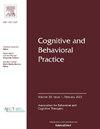书面暴露疗法的实施与调整:不同环境下的经验教训
IF 2.9
3区 心理学
Q1 PSYCHOLOGY, CLINICAL
引用次数: 0
摘要
书面暴露疗法(WET)是治疗创伤后应激障碍(PTSD)的一种很有前途的循证心理疗法(EBP),部分原因是它比其他一线创伤后应激障碍心理疗法需要更少的时间(即5个疗程,没有间歇任务)和更低的退出率。因此,WET有可能改善获得优质护理的机会,减少人员流失,特别是在难以接触到的人群中(例如,退伍军人、军人和少数民族群体)。有效地将WET转化为不同实践环境的过程可能需要开发与治疗一致的定制适应,以促进获得护理和采取干预措施。本文概述了最近以新颖方式实施WET的几项努力,同时强调对治疗核心机制的忠诚。实施工作包括建立一个西班牙语移民文化中心、现役军人行为健康、以技术为基础的方法,以及在退伍军人事务部(VA)的住宿和门诊环境中建立小组形式。我们将回顾从纳入的站点获得的经验教训和项目评估数据,并为希望实施WET的诊所管理者和提供者提供建议。本文章由计算机程序翻译,如有差异,请以英文原文为准。
Implementation and Adaptations of Written Exposure Therapy: Lessons Learned Across Settings
Written Exposure Therapy (WET) is a promising evidence-based psychotherapy (EBP) for posttraumatic stress disorder (PTSD), in part because it is less time-intensive (i.e., five sessions with no between-session assignments) and has lower dropout than other first-line PTSD psychotherapies. As such, WET has the potential to improve access to quality care and reduce attrition, particularly among difficult-to-reach populations (e.g., veterans, military service members, and minoritized groups). The process of effectively translating WET to diverse practice settings is likely to require the development of customized treatment-congruent adaptations to facilitate access to care and the uptake of the intervention.
This article outlines several recent efforts to implement WET in novel ways, while maintaining an emphasis on fidelity to the core mechanisms of the treatment. Implementation efforts include a cultural center with Spanish-speaking immigrants, active-duty military behavioral health, technology-based approaches, and group format in residential and outpatient Veterans Affairs (VA) settings. We will review lessons learned and program evaluation data from the included sites and will offer suggestions for clinic administrators and providers hoping to implement WET.
求助全文
通过发布文献求助,成功后即可免费获取论文全文。
去求助
来源期刊

Cognitive and Behavioral Practice
PSYCHOLOGY, CLINICAL-
CiteScore
4.80
自引率
3.40%
发文量
118
审稿时长
84 days
期刊介绍:
Cognitive and Behavioral Practice is a quarterly international journal that serves an enduring resource for empirically informed methods of clinical practice. Its mission is to bridge the gap between published research and the actual clinical practice of cognitive behavior therapy. Cognitive and Behavioral Practice publishes clinically rich accounts of innovative assessment and diagnostic and therapeutic procedures that are clearly grounded in empirical research. A focus on application and implementation of procedures is maintained.
 求助内容:
求助内容: 应助结果提醒方式:
应助结果提醒方式:


